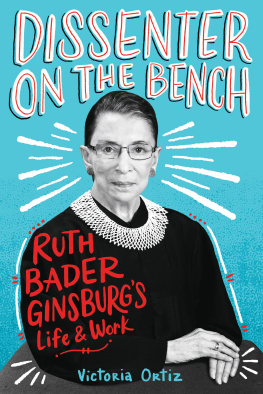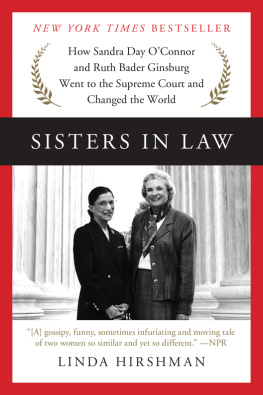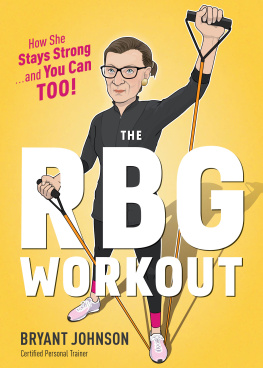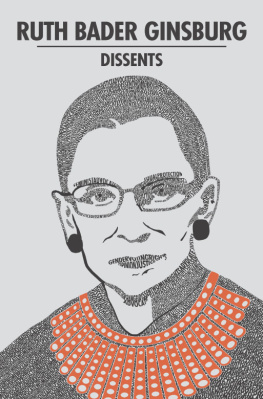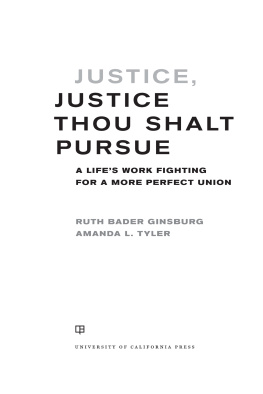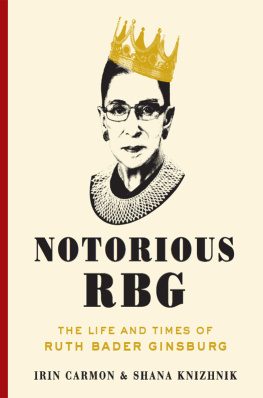CLARION BOOKS
3 Park Avenue, New York, New York 10016
Copyright 2019 by Victoria Ortiz
All rights reserved. For information about permission to reproduce selections from this book, write to or to Permissions, Houghton Mifflin Harcourt Publishing Company, 3 Park Avenue, 19th Floor, New York, New York 10016.
Clarion Books is an imprint of Houghton Mifflin Harcourt Publishing Company.
HMHBOOKS.COM
Cover art 2019 by Ellen Duda
Cover photograph 2019 MCT/Getty Images
Cover design by Sharismar Rodriguez
Title lettering by Ellen Duda
The Library of Congress has cataloged the print edition as follows:
Names: Ortiz, Victoria, 1942, author.
Title: Dissenter on the bench : Ruth Bader Ginsburgs life and work /Victoria Ortiz.
Description: New York : Clarion Books, 2019.
Identifiers: LCCN 2018035167 | ISBN 9780544973640 (hardback)
Subjects: LCSH: Ginsburg, Ruth Bader | JudgesUnited StatesBiography. | Women lawyersUnited StatesBiography. | Dissenting opinionsUnited States. | United States. Supreme CourtOfficials and employees.
Classification: LCC KF8745.G56 O78 2019 | DDC 347.73/2634dc23
LC record available at https://lccn.loc.gov/2018035167
eISBN 978-1-328-63990-5
v1.0519
To Jen,
whose endless supply of wisdom and patience made this book possible
ONE
A Teen Takes Her Case to the Supreme Court
SAVANA LEE REDDING was an honor-roll student at a middle school in Arizona. She was thirteen years old, a shy girl who liked nothing better than to work on her school projects, read books, and generally keep to herself. Ever since I was little, I loved school, she remembered. I never wanted to miss a day of it.
One October morning in 2003, the schools assistant principal pulled Savana out of her eighth-grade math class. He took her to his office and questioned her about items the school authorities had discovered in the possession of Marissa Glines, a classmate of Savanas, items that students were not allowed to have: prescription pills and an unidentified over-the-counter pill. Marissa Glines claimed that Savana had given her the forbidden pills. And another student reported to the assistant principal that Savana was planning to distribute pills to her fellow students at lunchtime that day.
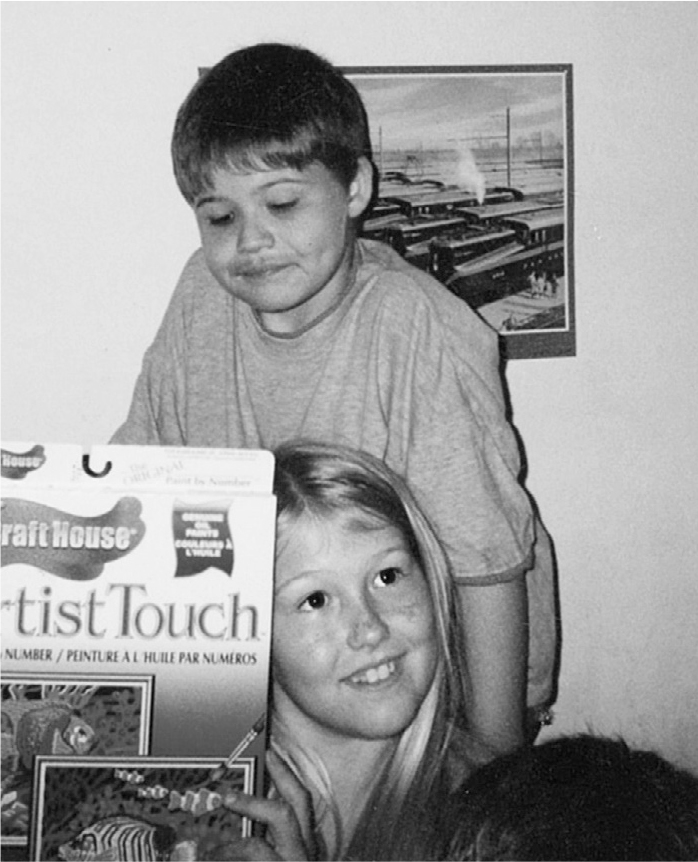
Savana Redding, 2003.
Savana denied ever having such pills, denied ever giving pills to Marissa, and denied ever making plans to distribute pills to other students. Confident because she was telling the truth, Savana agreed to let the assistant principal and an administrative assistant search her backpack. She knew they wouldnt find any pills. And indeed, they found no forbidden items in her backpack.
This was not the end of the story, however. The school authorities had only the unsupported accusations of two fellow students against Savana, the honor-roll student who had no disciplinary marks on her record. Even so, the assistant principal told the administrative assistant to take Savana to the nurses office. He instructed the two women, the assistant and the nurse, to search Savanas clothing for the contraband pills. Now Savana was getting nervous, even though she had no pills on her. She was feeling pressured and helpless. In her words, I didnt have an option. I was a little kid. I didnt have any idea how it would be handled.
Savana felt increasingly uncomfortable. The two school employees had her take off her jacket, socks, and shoes and found nothing incriminating. Then they ordered her to take off her black stretch pants with butterfly patches and her pink T-shirt. She complied reluctantly, and they found no pills in the seams of her garments. Then they asked me to pull my bra out and to the side and shake it, exposing my breasts, she recalled. Then they asked me to pull out my underwear and shake it. They also told me to pull the underwear out at the crotch and shake it, exposing my pelvic area. I was embarrassed and scared, but I felt I would be in more trouble if I did not do what they asked. I held my head down so that they could not see that I was about to cry.
Savana was told she could put her clothes back on, but she was not allowed to call her mother or return to her class. Instead, even after the assistant principal had been informed that no pills had been found, she was forced to sit outside his office for two and a half hours, in full view of any student or teacher who might pass by.
Savana couldnt tell her mother about what had happened until the end of the school day, when she went out to the car where her mother was waiting as she did every day to pick Savana up and take her home. Years later, Savanas mother, April Redding, wept at the memory of the helplessness she felt when she learned what had been done to her young daughter. When Savana came out, she was very withdrawn. She came into the vehicle not wanting to look at me. Crying. The school authorities never explained their actions to Savana or her mother, and they never apologized for putting her through the traumatizing strip search of her clothing and body.
This experience was so devastating for Savana that she never returned to her school. She was heartbroken. School had always been my safe place, she said later. I loved school so much, and thats where I always felt the most loved by teachers and friends. I was always the really nice girl who was kind to everyone. I did all my assignments, made the Honor Roll and principals Gold List every semester, and was well liked by the teachers.
Deeply angered by what had been done to her daughter, Savanas mother decided to fight against the intrusive school policy. First, Savana and her mom had to get legal help. They found it with the local Arizona chapter of the American Civil Liberties Union. The ACLU, as it is known, is a national organization that provides legal representation for people or groups whose constitutional rights and civil liberties have been threatened or violated by the government or some official agency. Savana and her mother began their lawsuit in federal district court. This is the trial-court level in the federal judiciary, which is the system that handles both criminal and civil cases under federal law.
In a federal civil case, an individual who believes she has been wronged because her constitutional rights have been violated can bring a lawsuit against a government official or an organization or a business entity. In a federal criminal case, a U.S. attorney, or federal prosecutor, files criminal charges against an individual or entity for allegedly violating a federal criminal statute, such as the one prohibiting counterfeiting. Federal civil cases involve matters governed by federal civil laws or the Constitution. Savanas case was a civil case against the school district that involved constitutional issues.
In the federal district court, Adam Wolf, Savanas attorney, argued that the school authorities had violated his young clients Fourth Amendment rights. This amendment of the U.S. Constitution guarantees the right to be free from unreasonable search and seizure by government agents, including public school employees. The attorney specifically argued that the unwarranted strip search of the thirteen-year-old honor student was unreasonable and illegal.
In preparing for this first stage of the legal process, Savana had to give an affidavita sworn statementabout the facts of the case. Throughout the months following the ordeal she had endured at her school, Savana had to repeat over and over again, in different settings and to different peopleall of them strangers to herthe details of the ugly, humiliating strip-search incident. Even though this was very difficult for her and she would not be personally affected if she lost, Savana was determined to see her lawsuit through to the end. Its more about other kids, she said. I really dont want this to happen again. Ever.

